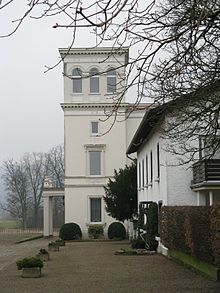Good Rothenhoff
Gut Rothenhoff is a manor and is located south of the Wiehen and Weser Mountains in the Great Weserbogen in the village of Costedt in the city of Porta Westfalica in the Minden-Lübbecke district .
history
Rothenhoff was mentioned for the first time in 1230. It was one of the court estates of the bishops of Minden and became the property of the Prussian state with the dissolution of the Duchy of Minden . After the end of the Thirty Years War , the estate was given to a Swedish envoy in order to obtain Swedish approval for the transfer of the Duchy of Minden to Brandenburg. This donation was canceled in 1666. Under Napoleon Rothenhoff became an imperial French domain, it was given to the French General de la Houssay, who was successful at Jena and Auerstädt. French marines under General Prince Eckmühl made quarters here for a short time .
After Prussia sold the estate to a Bremen merchant in 1822, it became a manor in 1848 and the owner, Caesar zu Rothenhoff, became a member of the Prussian state parliament. This was the father of Sophie Henschel .
From 1945 to 1954 the manor Rothenhoff was used by the English as the location of the Commander-in-Chief of the British Army of the Rhine . Prominent guests at this time included Princess Margaret and Philip, Duke of Edinburgh , as well as Field Marshal Bernard L. Montgomery and General Dwight D. Eisenhower at the Rothenhoff manor.
Building and park
The farm buildings and the manor house date from the era of the Bremen merchant family, the Caesar, who owned the manor from 1822 to 1915. The mansion was built as a new building in 1863 according to plans by the royal master builder Barring in the late classical style. The historic manor park was laid out in the style of the English landscape park in connection with the construction of the manor house in 1863 to the east and north of the manor house. The courtyard with the associated manor house and the hereditary burial site, which has existed since 1926, have been a listed building since 1984.
Todays use
Since the beginning of the 20th century there has been intensive gravel mining on the formerly agricultural areas. Due to the progressive gravel, the agricultural land and facilities were sold and leased to farmers in the area in 1971; the manor house and the park are used privately. The parts of the park north of the manor house no longer exist. The park east of the house has largely retained its character. To the south the park is bordered by a wall, to the east and north it merges into agricultural areas, bounded by hedges. The mansion and the park are in good condition thanks to the owner's initiative.
Others
Caroline Elisabeth Francisca Sophie Caesar was born on November 11, 1841 at the Rothenhoff manor. After the death of her father, she moved to Kassel with her mother in 1851. Here she married the entrepreneur Oscar Henschel in 1862. Henschel was the owner of Henschel & Sohn , a machine factory which he expanded into the world's leading locomotive factory. Sophie Henschel was one of the richest women in the empire, endowed with an exemplary sense of social responsibility.
See also
literature
- Albert Münstermann, Wolfgang Heinrich: Porta Westfalica - portrait of a landscape . Porta Westfalica undated
- Wilhelm Schrader: Costedt . In: City of Porta Westfalica . City of Porta Westfalica, Porta Westfalica 1979.
Web links
- Rothenhoff manor
- Rittergut Rothenhoff in the Alexander Duncker Collection (PDF file; 248 kB)
- Landschaftsverband Westfalen-Lippe: Gutspark Rothenhoff in LWL geodata culture
Coordinates: 52 ° 13 ′ 47 " N , 8 ° 51 ′ 48" E




